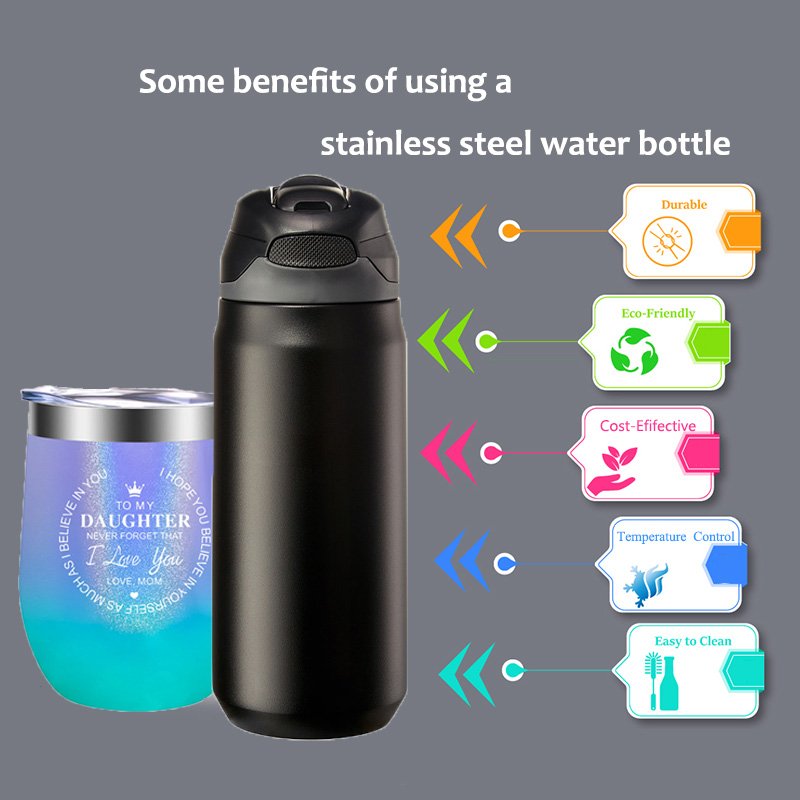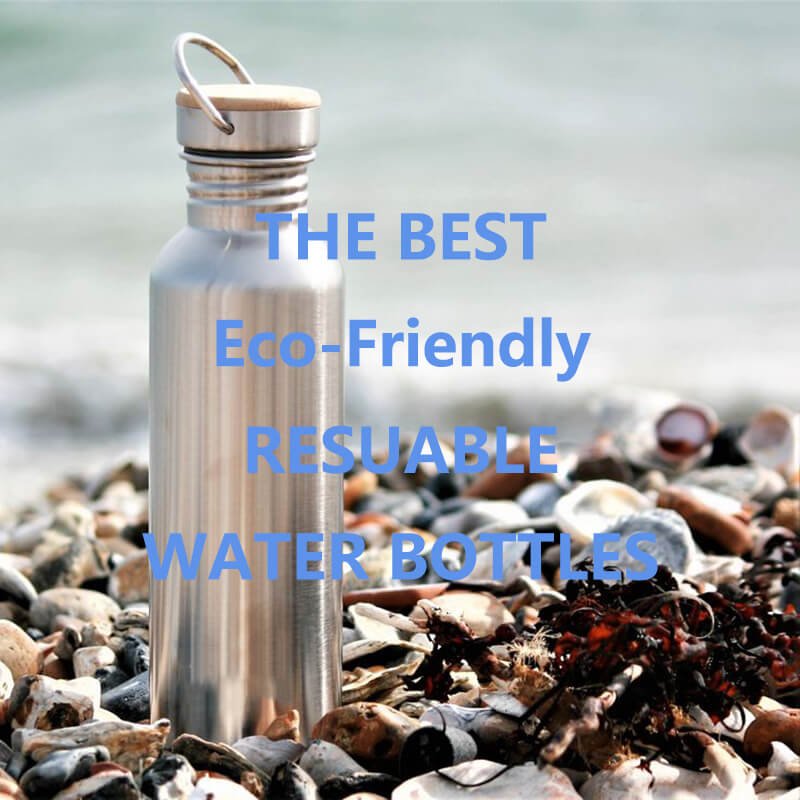The Best Material for a Sports Water Bottle
When it comes to choosing a sports water bottle, the material it is made of is an important factor to consider. The right material can make a significant difference in terms of durability, safety, and overall performance. In this article, we will explore the best materials for sports water bottles and help you make an informed decision.
1. Stainless Steel
Stainless steel is a popular choice for sports water bottles due to its durability and ability to keep beverages cold or hot for extended periods. It is resistant to rust, corrosion, and odors, making it ideal for outdoor activities and sports. Stainless steel bottles are also easy to clean and maintain, ensuring that your water tastes fresh every time.
One of the main advantages of stainless steel water bottles is their ability to retain temperature. Whether you prefer ice-cold water during a workout or a hot beverage on a chilly day, a stainless steel bottle will keep your drink at the desired temperature for hours.
Another benefit of stainless steel is its eco-friendliness. Unlike plastic bottles, stainless steel is a reusable and sustainable material, reducing waste and minimizing your carbon footprint.
2. BPA-Free Plastic
BPA (bisphenol A) is a chemical commonly found in plastic products, including water bottles. However, concerns about its potential health risks have led to the development of BPA-free plastics.
BPA-free plastic water bottles are lightweight, affordable, and come in a wide range of colors and designs. They are a popular choice among athletes and fitness enthusiasts due to their portability and convenience. These bottles are also shatterproof, making them a safe option for sports activities.
It’s important to note that while BPA-free plastic bottles are considered safe, they may still contain other chemicals that could leach into your drink. If you choose a plastic water bottle, look for ones labeled as “food-grade” or “safe for drinking water.”
3. Glass
While not as common as stainless steel or plastic, glass water bottles have their own unique advantages. Glass is a non-reactive material, meaning it won’t impart any flavors or odors to your drink. This makes it an excellent choice for those who prefer the purest taste of water.
Glass water bottles are also easy to clean and maintain, as they are dishwasher safe. They are a great option for those concerned about the potential health risks associated with plastic or metal bottles.
However, glass water bottles are more fragile than their stainless steel or plastic counterparts. They require careful handling to avoid breakage, especially during sports activities. If you opt for a glass bottle, look for one with a protective silicone sleeve to provide added durability and impact resistance.
Conclusion
When it comes to choosing the best material for a sports water bottle, there are several options to consider. Stainless steel offers durability, temperature retention, and eco-friendliness. BPA-free plastic is lightweight, affordable, and shatterproof. Glass provides a pure taste and is easy to clean, but requires careful handling.
Ultimately, the best material for a sports water bottle depends on your personal preferences and needs. Consider factors such as durability, insulation, safety, and environmental impact when making your decision. Whichever material you choose, remember to stay hydrated and enjoy your favorite activities with a reliable and convenient water bottle by your side.




маркетплейс аккаунтов продажа аккаунтов
купить аккаунт маркетплейс аккаунтов
маркетплейс аккаунтов маркетплейс аккаунтов
продажа аккаунтов соцсетей профиль с подписчиками
площадка для продажи аккаунтов магазин аккаунтов
маркетплейс аккаунтов соцсетей продать аккаунт
заработок на аккаунтах площадка для продажи аккаунтов
маркетплейс аккаунтов биржа аккаунтов
услуги по продаже аккаунтов магазин аккаунтов
заработок на аккаунтах биржа аккаунтов
купить аккаунт аккаунт для рекламы
профиль с подписчиками услуги по продаже аккаунтов
продать аккаунт гарантия при продаже аккаунтов
перепродажа аккаунтов услуги по продаже аккаунтов
Buy Account Account Buying Service
Accounts for Sale Website for Selling Accounts
Account market Accounts for Sale
Account Acquisition Marketplace for Ready-Made Accounts
Account Trading Platform Account Store
Account Buying Platform Account Buying Platform
Account trading platform Find Accounts for Sale
Account Buying Service https://accountsmarketplaceonline.com
Account Acquisition Secure Account Sales
Secure Account Sales Account Purchase
account marketplace https://bestaccountsstore.com/
buy and sell accounts accountsmarketplaceonline.com
profitable account sales purchase ready-made accounts
account trading platform account market
marketplace for ready-made accounts account trading
find accounts for sale buy pre-made account
account market account selling platform
account purchase website for selling accounts
accounts market buy account
account selling platform sell account
accounts marketplace online account store
buy pre-made account account market
account trading secure account purchasing platform
account market account market
account trading platform marketplace for ready-made accounts
sell pre-made account accounts market
account store account market
purchase ready-made accounts secure account sales
account sale secure account purchasing platform
ready-made accounts for sale sell pre-made account
account trading buy accounts
account selling service account selling service
account buying platform marketplace for ready-made accounts
purchase ready-made accounts account market
profitable account sales account acquisition
account acquisition secure account sales
account selling platform ready-made accounts for sale
buy and sell accounts buy pre-made account
account market buy accounts
buy and sell accounts https://accounts-marketplace.xyz/
account purchase buy-best-accounts.org
buy accounts https://social-accounts-marketplaces.live
account trading https://accounts-marketplace.live
accounts for sale https://social-accounts-marketplace.xyz
online account store account marketplace
account trading https://buy-accounts-shop.pro
account selling platform https://buy-accounts.live
online account store https://social-accounts-marketplace.live
account selling service https://accounts-marketplace.online/
database of accounts for sale https://accounts-marketplace-best.pro
маркетплейс аккаунтов соцсетей akkaunty-na-prodazhu.pro
покупка аккаунтов https://rynok-akkauntov.top
маркетплейс аккаунтов https://kupit-akkaunt.xyz
продать аккаунт магазины аккаунтов
площадка для продажи аккаунтов https://akkaunty-market.live
купить аккаунт https://kupit-akkaunty-market.xyz
площадка для продажи аккаунтов https://akkaunty-optom.live
маркетплейс аккаунтов https://online-akkaunty-magazin.xyz
продажа аккаунтов akkaunty-dlya-prodazhi.pro
купить аккаунт kupit-akkaunt.online
buy aged fb account facebook account sale
buying facebook account buy facebook profile
buy fb ad account buying fb accounts
buy facebook ad accounts cheap facebook advertising account
buy fb ad account facebook ads account buy
facebook ad account buy https://ad-account-for-sale.top
buy facebook account for ads cheap facebook advertising account
google ads agency account buy https://buy-ads-account.top/
buy verified google ads account https://buy-ads-accounts.click
google ads reseller https://ads-account-for-sale.top/
buy google ads accounts buy verified google ads accounts
google ads accounts https://buy-ads-invoice-account.top
buy verified google ads account https://buy-account-ads.work
buy google ads buy google ads verified account
buy google agency account https://ads-agency-account-buy.click
facebook verified business manager for sale https://buy-business-manager.org/
buy old google ads account https://buy-verified-ads-account.work
buy bm facebook buy-bm-account.org
buy facebook business manager buy-verified-business-manager-account.org
verified bm buy-verified-business-manager.org
buy verified facebook business manager https://business-manager-for-sale.org
facebook business manager account buy https://buy-business-manager-verified.org/
buy facebook verified business manager https://buy-bm.org
buy verified bm https://verified-business-manager-for-sale.org/
verified bm buy-business-manager-accounts.org
buy tiktok ads accounts https://buy-tiktok-ads-account.org
buy tiktok ads accounts https://tiktok-ads-account-buy.org
buy tiktok ads account https://tiktok-ads-account-for-sale.org
buy tiktok business account https://tiktok-agency-account-for-sale.org
tiktok ad accounts https://buy-tiktok-ad-account.org
tiktok agency account for sale https://buy-tiktok-ads-accounts.org
buy tiktok business account https://buy-tiktok-business-account.org
buy tiktok business account https://tiktok-ads-agency-account.org
buy tiktok ads https://buy-tiktok-ads.org
buying facebook accounts account trading buy accounts
facebook account sale account acquisition account purchase